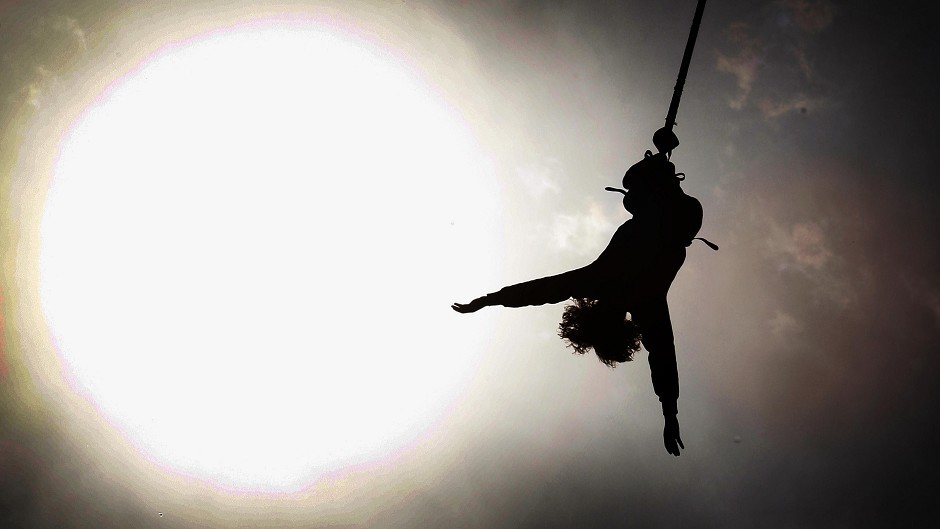My heart is pounding as I shuffle towards the end of a narrow platform suspended 150ft above the lush green canopy of Monteverde’s Cloud Forest.
Is it too late to chicken out, I wonder, as a long rope is attached to the harness around my waist and I feel my legs turn to jelly?
Clearly it is, because a gate is opening and I’m about to launch myself into the unknown…
How did I end up here?
Sandwiched between Nicaragua and Panama at the southern tip of Central America, Costa Rica has both Caribbean and Pacific coastlines – but sunbathing isn’t what I’ve got in mind.
I’m here to indulge my adventurous side, baby-bungee jumping, zip-wiring and rafting through strikingly diverse landscapes.
Travelling as part of an organised tour, we first head to Manuel Antonio on the Pacific coast for a surfing lesson.
I’ve attempted this devilishly difficult sport once before, and strong waves mean my second stab isn’t any more accomplished.
I try to stand upright but crash onto the seafloor and am forced to limp out of the water, kneecap throbbing.
I’m tempted to give up there and then, but I persevere and within the hour I’m catching waves left, right and centre, and remain standing all the way to the shore.
As well as being a surfer’s paradise, Manuel Antonio is also famous for its national park, comprised of verdant forest, muddy mangroves and azure marine reserves.
You can follow the clearly mapped trails independently, but for wildlife spotting, a guide is recommended.
Without the expert eyes of Efrain, who grew up in the area before it was designated a national park, there’s no way I would have spotted the tiny orange arboreal crabs scuttling in the damp undergrowth, or the snoozing ‘perezoso’ hanging upside down from a leafy branch far above our heads.
Translated literally as ‘lazy bear’, this grey furball is one of the country’s famously sedentary mammalian residents, a two-toed sloth.
He looks soaking wet, like he’s just had a bath, and through Efrain’s telescope, I can see his shiny brown snout and sleepy eyes.
A slow metabolism and veggie diet are the reason that sloths move like they’re wading through treacle and sleep for up to 18 hours a day.
No wonder they look like they’re always smiling.
The next time I spy a furry two-toed cutie, however, I’m in the midst of a decidedly more energetic activity.
I’m perched on the side of a bright red inflatable raft, paddling for dear life as we course down the fast-flowing Balsa River, close to the town of La Fortuna.
Don’t be fooled, as I was, into thinking white-water rafting is simply a case of letting the current carry you along.
You have to paddle – hard – to make sure you take the right path through rapids, and follow orders (‘lean in!’, ‘get down!’) when you hit the really rocky patches.
It’s insanely fun. I even enjoy the moment we turn back to ‘surf’ a fierce-looking rapid and I’m thrown overboard.
My guide, Marco, pulls me spluttering from the water, hanging on with all my might and grinning from ear to ear as we hit more frothy torrents.
And the thrills don’t end there.
About 30 miles south, following a bus ride along steep and winding roads, it becomes clear why they call this a cloud forest, as fluffy marshmallow shapes obscure the mountaintops.
Monteverde is renowned for its rich botanical life. In the 1950s, biologists came here to study the thousands of insect and animal species that populate the area.
To assist with their research, they introduced an activity that has become one of Costa Rica’s most popular tourist pastimes.
Instead of climbing up and down trees all day, they realised it was faster to hook wires between the treetops and use a harness to shoot between them.
Et voila, zip-lining was born, and Costa Rica is now considered the best place in the world to do it.
Starting off in seated pose, legs crossed and gloved hands on the wire keeping me steady, I hurtle along several sections – each getting progressively longer. Eventually, I switch into a ‘superman’ pose, lying face down with arms outstretched.
Soaring like a bird along a 1.5km stretch, 100 metres above the hills, is exhilarating.
The same goes for the finale of my canopy tour, which is when I find myself jelly-legged and about to leap off that sky-high platform.
I feel an almighty lurch in my stomach as I plummet to the ground, before the rope of the ‘tarzan swing’ pings into action and I swoop upwards, whooping with delight (and relief).
I’m shaking as I’m lowered to safety, adrenaline coursing through my veins.
On the bus back to capital city San Jose, when my heart rate has just about returned to normal, my baby-bungee jump experience has got me wondering if I could tackle the real thing, and I’ve heard there’s a spectacular place nearby to do it…
Alas, my time in this action-packed paradise has come to an end, and there are only so many unforgettable firsts I can pack into one trip.
That bungee jump will have to wait for next time.
